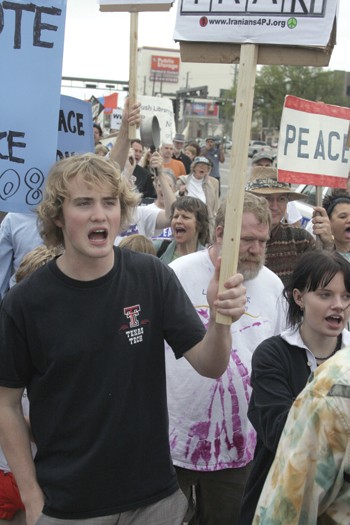
(Nick McCarthy)
Carrying signs and chanting for peace and justice, hundreds of protestors marched yesterday from Mockingbird Station to the potential site of the Bush Library on Potomac Avenue where they rallied against the Iraq War. The protest also commemorated the fourth year of the war.
The rally included speakers from the Dallas Peace Center, Methodist ministers and other protestors and a musical performance by the reggae band Aton.
Hadi Jawad, chair of the End the Occupation of Iraq Committee at the Dallas Peace Center, helped organize the protest. He said he was pleased with the turnout and pointed out the diverse demographic involved, which included young, old, black, white, Arab, Hispanic and everything in between.
“People are weary of war and scared,” Jawad said. “They spoke clearly last November in the mid-term elections.”
Notable people at the rally included professors Susanne Johnson and Bill McElvaney, the two faculty members who kick-started the campus debate about the Bush Library complex.
Johnson said she attended because she was hopeful there would be more of a discussion about the Bush Institute.
“We have to keep focused on academic concerns, not whether we support Bush’s policies,” she said.
Johnson also said she was disappointed that more SMU faculty and staff members did not show up.
Dozens of policemen carrying shields and wearing helmets were there, and organizers acknowledged their professional conduct. The police didn’t have to do much, however, as the protest was non-violent.
“It’s a peaceful protest – no bad language or violence,” Doug Fielder, a student at Bishop Dunne Catholic School said. “It’s just a group of people getting together to show their support for what they believe in.”
Fielder, who learned about the protest from a teacher, came to the rally because he thinks the U.S. needs to pull out of Iraq.
“Being an 18-year-old, I’m worried about the possibility of selective service, and I’m sick of troops getting killed for nothing,” he said.
According to an Associated Press count, as of yesterday at least 3,217 members of the U.S. military have died since the beginning of the war in March 2003.
Estimates for the number of Iraqi civilians killed during the conflict range from 59,326, according to the independent Iraq Body Count, to 655,000, according to the controversial Lancet study. The Lancet is a peer-reviewed medical journal and its estimate is based on surveys and sampling methods and includes deaths due to increased lawlessness, degraded infrastructure and poorer healthcare.
Protestor Leslie Harris discussed the reality of the deaths and destruction caused by the war with a small group of SMU students who came out with pro-Bush signs to conduct a small counter-protest.
“People were livid because they couldn’t cross the street,” Harris said. “A student was upset because she couldn’t get to a fashion show. I have friends whose children have been killed in this war, and she was very upset that we inconvenienced people.”
According to Harris, neither voting nor writing letters moved people to listen, so a protest was the next step to take.
“We’re ‘inconveniencing’ people in a way that people are going to pay attention and realize there’s something more important going on than a fashion show or doctor’s appointment,” Harris said. “People are dying and coming back without arms and legs.”
Sophomore Andrew Lorig was one of the students who debated with Harris and other protestors.
“I respect their opinions, but I’m from New York and I don’t respect people with 9/11 truth signs who think that 9/11 was a mass conspiracy and that the government killed its own people,” Lorig said. “That’s very insulting.”
Although the protest was mostly against the Iraq War, some protestors did speak out against the possibility of the Bush library at SMU.
“I hope the people of University Park are glad to see us, though I don’t think they are,” Jawad said. “The Bush Library will provoke this kind of protest for a long time.”
Protestor Wade Campbell thinks that the library, should it come to SMU, will leave an interesting legacy.
“A city once blamed for assassinating a president will now be home to the president that’s assassinating the country,” Campbell said.
Sophomore Abby Seibel was surprised that issues extraneous to the war such as the Bush library and immigration were discussed at the protest, as she isn’t completely against the library, but she supported the protest regardless.
“I decided to join the protest because so many people are too stuck in the middle,” Seibel said. “Someone needs to be pushing from the other side. People need to know that there is opposition to the war.”
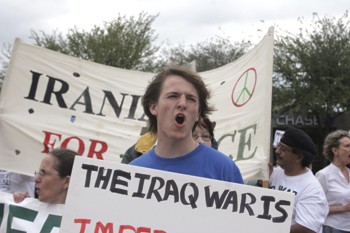
(Nick McCarthy)
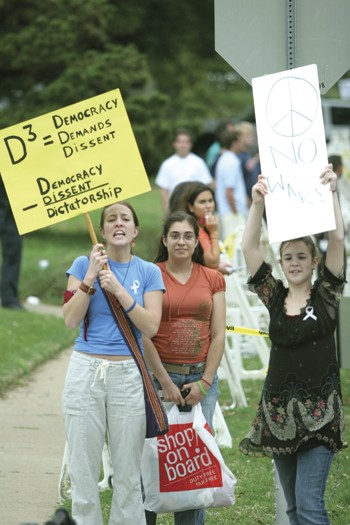
(Nick McCarthy)
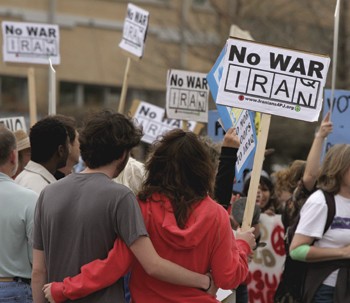
(Nick McCarthy)
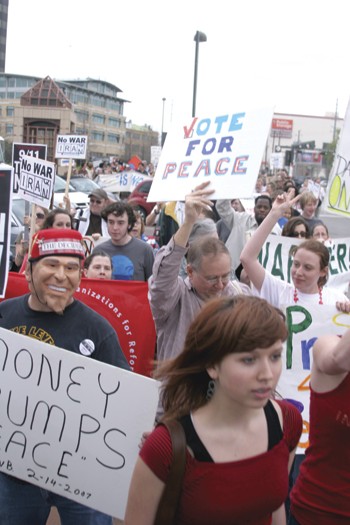
(Nick McCarthy)








